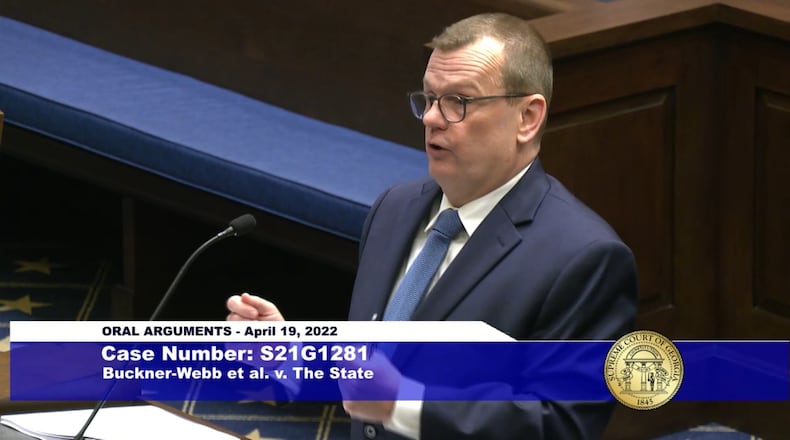A public defender representing six former educators convicted in the Atlanta Public Schools test-cheating scandal argued Tuesday he should not be required to represent all six clients in their appeals because to do so would raise conflicts of interest.
If forced to represent them on his own, the educators “would proceed with motions for a new trial with counsel divided in his loyalty, his attention, his orientation of the defense,” Fulton County public defender Stephen Scarborough told the Georgia Supreme Court.
The appeal is occurring almost seven years after the conclusion of the trial, believed to be the longest in state history. Scarborough was appointed to represent six of the defendants on appeal, beginning with their motions for a new trial before trial judge Jerry Baxter.
At least two years after taking the case, Scarborough told Baxter he realized he should not be representing all six because they had competing interests. But Baxter, expressing frustration by the lengthy passage of time, denied Scarborough’s motion to allow his clients to have separate, conflict-free counsel.
Criminal charges were brought against Atlanta educators after The Atlanta Journal-Constitution, in both 2008 and 2009, revealed some schools were posting statistically unbelievable scores on state tests. Of the 35 educators indicted for racketeering and other offenses, 21 pleaded guilty and two died before trial. Of the 12 who stood trial, which lasted almost eight months, 11 were convicted.
As it now stands, Scarborough represents six educators whose initial appeals have yet to be considered: Diane Buckner-Webb, Theresia Copeland, Sharon Davis-Williams, Tabeeka Jordan, Michael Pitts and Shani Robinson.
During arguments, some justices expressed concern that a ruling in Scarborough’s favor would open a Pandora’s Box that would allow countless future defendants to file appeals asserting their attorneys have conflicts of interest. They also noted that even if Scarborough has an alleged conflict and is required to proceed, his clients could later file appeals seeking to correct the problem.
Regardless of how the court rules, it will likely take a few more years before the six former educators’ appeals are decided. If they ultimately lose, Buckner-Webb, Copeland and Robinson face one year in prison, Jordan faces two years, and Davis-Williams and Pitts face three years.
Even though justices worried about the precedent they might set in Scarborough’s appeal, some expressed concern about requiring Scarborough to proceed if he has divided loyalties to his six clients.
“If my counsel is representing both of us and in order to best represent my co-defendant is required to implicate me and does so, have I received conflict-free counsel?” Justice Charles Bethel asked. “No.”
Justice Sarah Hawkins Warren acknowledged that the defendants could try to vindicate their rights in a later appeal if Scarborough is required to stay. But she also noted that Scarborough cannot remedy the problems he is now facing.
“If he’s correct, saying I have to do something unethical, I have to make choices where I know I have a better defense for defendant number one, but I can’t assert it because that would conflict with defendant number two,” she said. “And then defendant number one was going to point the finger at defendant number two.”
She added, “This elaborate problem can’t be fixed at the end of the day. Once it’s happened, it’s happened.”
Chief Justice David Nahmias suggested what seemed to be an easy solution: Get the Public Defender’s Office to appoint separate counsel for all six defendants so no potential conflicts exist. He asked parties to notify the court if there are any new developments in that regard before the court issues its opinion, expected in the coming months.
About the Author
The Latest
Featured




